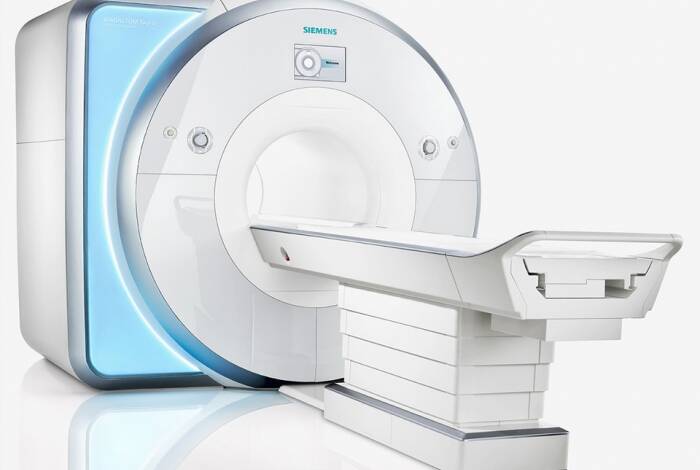Cranial angiography MRI examination
Cranial angiography MRI scan is used to examine the condition of the blood vessels in the brain. A non-invasive form of examination which, unlike a CT scan, does not involve radiation exposure. In some cases, it may be an alternative to catheter angiography, which is performed each time with a contrast agent.
MRI is an imaging diagnostic procedure that uses magnetic field to take detailed images of the human body.
The magnetic field generated by the device converts the energy changes in the body into a high-resolution, three-dimensional image by a high-performance computer. At Medicover Diagnostic Center, we use equipment that works with a closed but extremely short tube, it is 10 centimetres wider than average, with a diameter of 70 cm, thus helping reduce the feeling of confinement.

What types of diseases does a cranial angiography MRI scan help diagnose?
Your doctor may request a cranial angiography MRI scan to identify the following diseases and lesions:
- aneurysm
- aortic stenosis
- aortic rupture
- AVM (arteriovenous malformation), usually a congenital disorder, vascular anomaly
In case of which symptoms is it recommended to have the scan done?
Your doctor may consider an examination if you experience dizziness, incoordination, blurred vision, paralysis and speech problems.
How to prepare for a cranial angiography MRI scan?
In all cases, it is recommended that the treating physician be consulted for details prior to the MRI examination, although native examination does not require special preparation. On the other hand, it is important to know that due to the high magnetic field, it is forbidden to bring any metal, device or object containing metal into the examination room! This applies to jewellery, piercings in the body, and some makeup products may also contain a substance that affects the success of the test. Prior to an examination with contrast agent, specialist consultation is essential. Kidney function laboratory results showing creatinine and urea values are also required to perform this type of scan. In case of an examination with contrast agent, you should not eat for 6 hours beforehand.
How is a cranial angiography MRI scan performed?
Following the orientation prior to the cranial angiography MRI examination, the operator will accompany you into the examination room and then ask you to be seated on the examination bed.
The operator adjusts the correct body position, places the coils required for the examination, and then the examination bed lifts you into the magnetic tube. It is important to remain still during the scan, you can only change your body position on the instructions of the operator.
The examination takes an average of 30 minutes, while you can communicate with our colleague continuously through the built-in microphone and speaker. The machine makes a loud, rattling sound that can be reduced with earplugs.

When is a cranial angiography MR scan not possible to be performed?
- The test cannot be performed in the first trimester of pregnancy.
- The test cannot be performed if you do not have an MRI compatible metal, implant, prosthesis (pacemaker), orthopaedic metal (screw, plate, nail, wire), implanted joint prosthesis, prosthetic limb, implanted defibrillator, neurostimulator, implanted drug dispenser, vascular implants (e.g. clips, vascular occlusion devices), ear implants, metal foreign body (e.g. bullet, splinter, other electronic implants). Therefore, in case of an implant, implanted metal, prosthesis, please bring a written certificate of its compatibility with MRI examination (certified by the implanting specialist, institution) for the examination itself, which clearly states: the suitability to enter the MRI examination room, to perform the MRI examination and marking the maximum magnetic field strength (1.5 Tesla, 3 Tesla) for the device or implant. Inform the person performing the examination about the implant beforehand.
- If the subject weighs more than 200 kilograms, but it also depends on the circumference of the abdomen.
- In case of a scan with contrast agent, if the eGFR of the kidney function is below 45 ml/min, the test is not performed.
What to expect after the test?
The finding in itself is not a diagnosis. After the scan, please always consult a specialist with the result.
The contrast agent used for MRI examinations is gadolinium-based. In rare cases, hypersensitivity might happen, which may occur in the form of an allergic reaction immediately after administration of the contrast agent.
When is the result of the cranial angiography MRI scan expected?
The completed scan will be reviewed by the radiologist and the result will be available in our online system after 5 working days.

